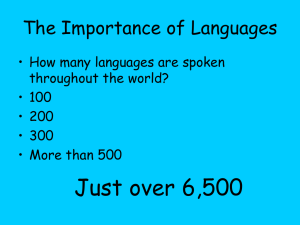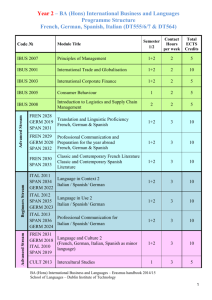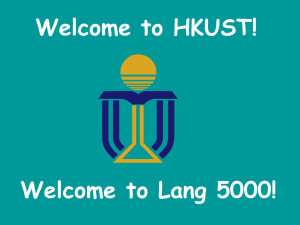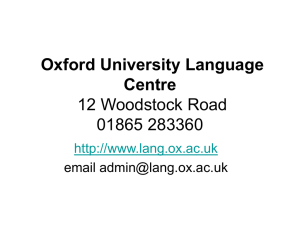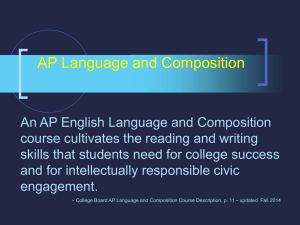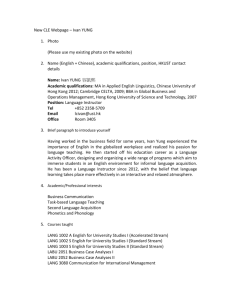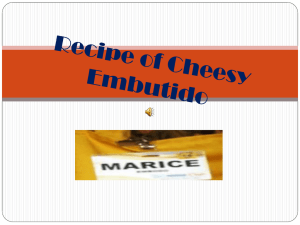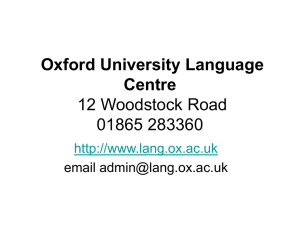IBL 4 Programme Structure and Module Descriptors 2014-2015
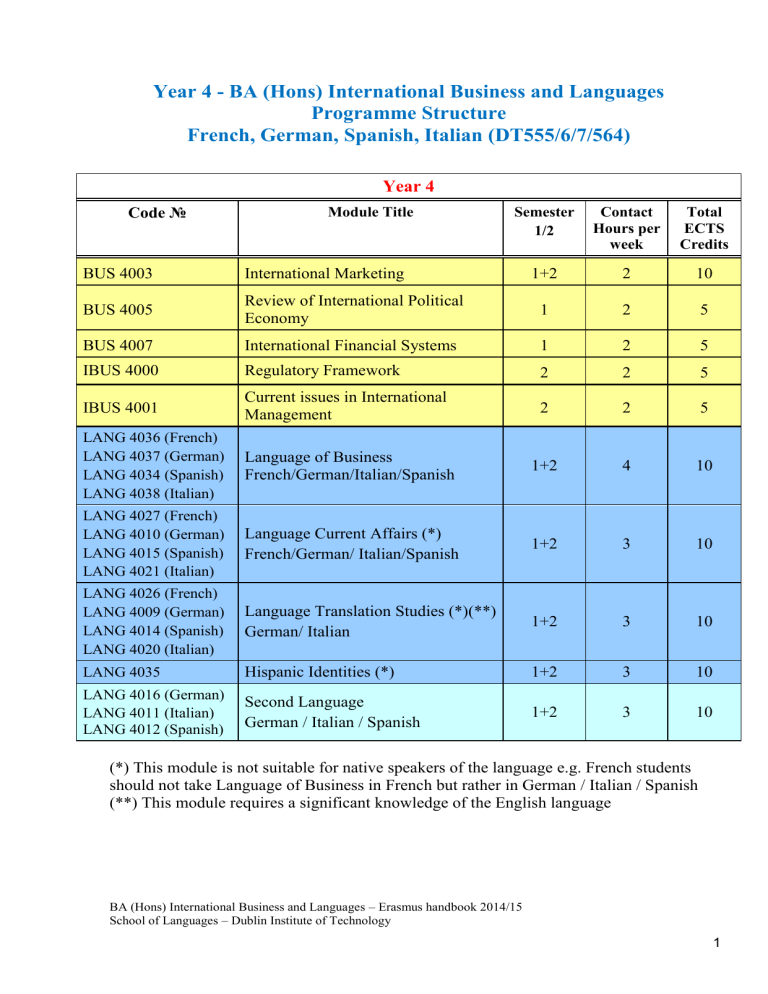
Year 4 - BA (Hons) International Business and Languages
Programme Structure
French, German, Spanish, Italian (DT555/6/7/564)
Code №
Year 4
Module Title Semester
1/2
Contact
Hours per week
Total
ECTS
Credits
BUS 4003
BUS 4005
International Marketing
Review of International Political
Economy
1+2
1
2
2
10
5
BUS 4007 International Financial Systems 1 2 5
IBUS 4000 Regulatory Framework 2 2 5
IBUS 4001
Current issues in International
Management
2 2 5
LANG 4036 (French)
LANG 4037 (German)
LANG 4034 (Spanish)
LANG 4038 (Italian)
LANG 4027 (French)
LANG 4010 (German)
LANG 4015 (Spanish)
LANG 4021 (Italian)
Language of Business
French/German/Italian/Spanish
Language Current Affairs (*)
French/German/ Italian/Spanish
1+2
1+2
4
3
10
10
LANG 4026 (French)
LANG 4009 (German)
LANG 4014 (Spanish)
LANG 4020 (Italian)
LANG 4035
Language Translation Studies (*)(**)
German/ Italian
1+2 3 10
Hispanic Identities (*) 1+2 3 10
LANG 4016 (German)
LANG 4011 (Italian)
LANG 4012 (Spanish)
Second Language
German / Italian / Spanish
1+2 3 10
(*) This module is not suitable for native speakers of the language e.g. French students should not take Language of Business in French but rather in German / Italian / Spanish
(**) This module requires a significant knowledge of the English language
BA (Hons) International Business and Languages – Erasmus handbook 2014/15
School of Languages – Dublin Institute of Technology
1
BA (Hons) International Business and English (DT558)
Programme Structure
Code №
Year 4
Module Title Semester
1/2
Contact
Hours per week
Total
ECTS
Credits
BUS 4003
BUS 4005
International Marketing
Review of International Political
Economy
1+2
1
2
2
10
5
BUS 4007 International Financial Systems 1 2 5
IBUS 4000 Regulatory Framework 2 2 5
IBUS 4001
Current issues in International
Management
2 2 5
LANG 4018
LANG 4017
Current Affairs (*)
Rhetoric & Writing Workshop (*)
1+2
1+2
3
3
10
10
LANG 4016 (German)/
LANG 4011 (Italian) /
LANG 4012 (Spanish)/
Minor Language
German / Italian / Spanish
1+2 3 10
* These modules are open to Erasmus students who have passed the English for Academic
Purposes test at Advanced Level
BA (Hons) International Business and Languages – Erasmus handbook 2014/15
School of Languages – Dublin Institute of Technology
2
BA (Hons) Chinese and International Business (DT565)
Programme Structure
Year 4
Code №
Module Title Semester
1/2
Contact
Hours per week
BUS 4003 International Marketing
BUS 4005
Review of International Political
Economy
BUS 4007 International Financial Systems
IBUS 4000 Regulatory Framework
IBUS 4001
Current issues in International
Management
LANG 4024 Chinese Oral
LANG 4022 Chinese Written Language
LANG 4023 Chinese Cultural Studies 4
1+2
1
1
2
2
1+2
1+2
1+2
2
2
2
2
2
2
3
3
5
5
5
5
10
10
Total
ECTS
Credits
10
5
BA (Hons) International Business and Languages – Erasmus handbook 2014/15
School of Languages – Dublin Institute of Technology
3
International
Marketing
Review of
International
Political Economy
International
Financial Systems
International Business and Languages
Module Descriptors Year 4
Business Modules (*)
Today, virtually all major firms must compete in a global marketplace.
Participants in this module will be given a framework to understand the global marketing environment. They will be taught how to analyse global marketing opportunities. They will develop global marketing strategies.
They will design global marketing programmes and will develop the skills to manage the global marketing effort.
International Political Economy (IPE) is the rapidly developing social science field of study that attempts to understand international and global problems using an eclectic interdisciplinary array of analytical tools and theoretical perspectives. The growing prominence of IPE as a field of study is in part a result of the continuing breakdown of disciplinary boundaries between economics, international relations and politics in particular and among the social sciences generally. Increasingly, the most pressing and interesting problems are those that can best be understood from a multidisciplinary, interdisciplinary, or transdisciplinary point of view.
IPE is the study of a problématique, or set of related problems. The traditional IPE problématique includes analysis of the political economy of international trade, international finance, North-South relations, multinational corporations, and hegemony. This problématique has been broadened in recent years as many scholars have sought to establish a New
IPE that is less centered on International Politics and the problems of the nation-state and less focused on economic policy issues.
This module offers a broad introduction to the workings of the global financial system, the dynamics of the main financial markets, the nature and purpose of key financial institutions and the role played by central banks and regulatory agencies. An important part of the module focuses on the 2007-
2009 global financial crisis, reviewing its causes and consequences, as well as evaluating the merits of government intervention schemes in the U.S. and
Europe.
Current issues in international management
This module examines in a critical and analytical fashion the philosophy and practices of International Management. Each topic provides students with a solid and invigorating analysis of all aspects of International Management.
Regulatory
Framework
A legal knowledge is essential in any business environment with the increasing opportunities and threats posed by liberalisation, deregulation, cross-border trade and new social and tortuous legislation. This course will give students a grounding in the basic concepts of law and some of the particular elements relevant to international business.
(*) For all year 4 Business modules, it is recommended students have passed the Upper Intermediate
Level of English for Academic Purposes test.
BA (Hons) International Business and Languages – Erasmus handbook 2014/15
School of Languages – Dublin Institute of Technology
4
Language of Business
(French / German /
Spanish / Italian)
Current Affairs
(French / German /
Spanish / Italian)
Language Modules
This module enables students to develop and apply their oral and written linguistic skills adequately to a range of everyday professional tasks in the commercial sector.
This module builds on the knowledge, experience and linguistic competence acquired by the students during their year abroad. It consolidates and further explores political, economic and social topics and trends of the target countries and their current affairs. The module also consolidates and builds on language competency by working further to perfect the students’ level of linguistic accuracy and foster deeper awareness of target language style, register and tone.
Translation Studies
(German / Italian)
This module will focus on the theory and practice of translation. Students will learn to apply theory and use basic terminology relating to translation techniques. The module will also consolidate and build on the language competency acquired during the year abroad (or equivalent) by working to further perfect the student’s reading skills in the TL and their level of grammatical accuracy and it will seek to foster a deeper awareness of target language style, register and tone.
Hispanic Identities
(Spanish)
Building on the knowledge, experience and linguistic competence acquired by the students during their year abroad, this module will provide an overview of the linguistic, ethnic and cultural diversity covered by the term ‘Hispanic’. The evolution of Hispanic identity throughout the Spanish-speaking world will be considered in its historical, political and socio-economic context. In addition to set texts covering the historical, political and socio-economic background, the module will draw on and examine film, literature, art and popular culture as vehicles for the expression of Hispanic identity. The module also consolidates and builds on language competency by working further to perfect the students’ level of linguistic accuracy and foster deeper awareness of target language style, register and tone.
Minor Language
This module consolidates and builds on the language competency acquired during year 1 and year 2 and introduces the learners to the professional language needed to interact on a basic level with business people from the target countries.
Rethoric and Writing
Workshop
(DT 558 module)*
This module practices advanced reading, writing, and speaking strategies for approaching multi-disciplinary content in English.
Rhetorical strategies covered include metaphor, hyperbole, symbolism, overstatement and understatement, card-stacking, and various other persuasive techniques used in both speech and writing.
Writing practice focuses in particular on clarity, cohesion, grammatical competence, paragraphing, outlining, paraphrasing, summarising, argumentation, originality, and the diligent avoidance of plagiarism.
Current Affairs
(DT558 module)*
This module builds on the knowledge, experience and linguistic competence already acquired by the students. It consolidates and further explores political, economic and social topics and trends of the target countries and their current
BA (Hons) International Business and Languages – Erasmus handbook 2014/15
School of Languages – Dublin Institute of Technology
5
affairs. The module also consolidates and builds on language competency by working further to perfect the students’ level of linguistic accuracy and foster deeper awareness of target language style, register and tone.
* These modules are open to Erasmus students who have passed the English for Academic Purposes test at Advanced Level.
Chinese Language modules
Oral Chinese
This module further progresses the students’ command of Chinese with an emphasis on the oral language. It will be taught exclusively through the medium of the Chinese language.
Written Chinese
This module further progresses the students’ command of Chinese with an emphasis on the written language. This module will be taught exclusively through the medium of the Chinese language.
Chinese Cultural Studies
This module consolidates students’ knowledge of historical and contemporary issues about Asia using films as a learning tool. It will prepare students for the production of subtitles into English and introduce them to translation techniques as well as to the issues faced by a professional translator. Learners will be exposed to a more advanced level of spoken Chinese. This module will be taught exclusively through the medium of the Chinese language excluding necessary explanations concerning the nuances of English subtitles.
BA (Hons) International Business and Languages – Erasmus handbook 2014/15
School of Languages – Dublin Institute of Technology
6
